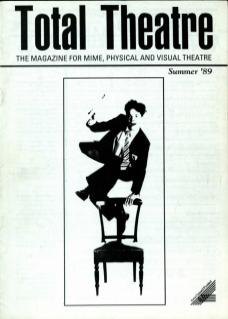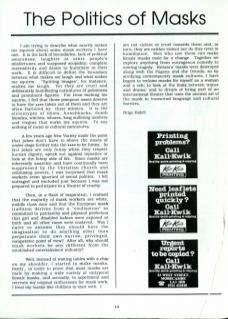I am trying to describe what exactly makes me squirm about some mask workers I have met. It is the lack of boundaries, lack of political awareness, laughter at other people’s misfortunes and supposed stupidity: complete insensitivity and desire to humiliate in their work. It is difficult to define the boundary between what makes me laugh and what makes me squirm. Spitting Image, for instance, makes me laugh. Yet there they are cruel and deliberately humiliating caricatures of politicians and prominent figures. Far from making me squirm, I feel that those pompous asses deserve to have the **** taken out of them and they are often flattered by their mimics. It is the stereotypes of idiots, hunchbacks, dumb blondes, witches, whores, long suffering mothers and virgins that make me squirm. To say nothing of racial or cultural caricatures.
A few years ago New Variety made the point that jokes don’t have to shove the noses of under-dogs further into the **** to be funny. In fact jokes are only funny when they respect human dignity, speak out against injustice, or look at the funny side of life. Since masks are inherently anarchic and have continually been suppressed by the Christian church and colonising powers, I was surprised that mask workers seem ignorant of social politics. I felt outraged and excluded just because I was not prepared to participate in a theatre of cruelty.
Then, in a flash of inspiration, I realised that the majority of mask workers are white, middle-class men and that the European mask tradition derives from a ‘civilisation’ so committed to patriarchy and physical perfection that girl and disabled babies were exposed at birth and all other races were enslaved. Was I naive to assume they should have the imagination to do anything other than perpetuate their own narrow, privileged, competitive point of view? After all, why should mask workers be any different from the established entertainment industry?
Well, instead of waiting tables with a chip on my shoulder, I started to make masks. Firstly, in order to prove that most masks are male by making a wide variety of untypical female masks, and secondly, to experiment with and recreate my original enthusiasm for mask work. I treat my masks like children to start with. I am not violent or cruel towards them and, in turn, they are neither violent nor do they revel in humiliation. Men who use them can make female masks male for a change. Together we explore anything from outrageous comedy to moving tragedy. Britain’s masks were destroyed along with the Pagans and the Druids, so by studying contemporary mask cultures, I have begun to reclaim masks for myself as a woman and a celt; to look at the links between trance and drama; and to dream of being part of an international theatre that uses the ancient art of the mask to transcend language and cultural barriers.

